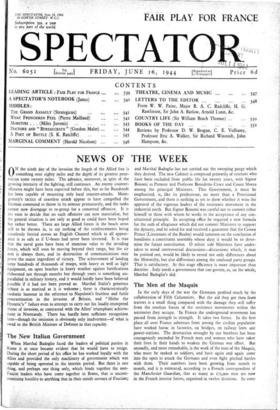The New Italian Government
When Marshal Badoglio faced the leaders of political parties in Rome it at once became evident that he would have to resign. During the short period of his office he has worked loyally with the Allies and provided the only machinery of government which was capable of being operated in the interim period. But there is one thing, and perhaps one thing only, which binds together the non- Fascist leaders who have come together in Rome, that is uncom- oromising hostility to anything that in their minds savours of Fascism; and Marshal Badoglio has not carried out the sweeping purge which they desired. The new Cabinet is composed primarily of veterans who have been excluded from public life for twenty years, with Signor Bonomi as Premier and Professor Benedetto Croce and Count Sforza among the principal Ministers. This Government, it must be emphasised, is, like its predecessor, no more than a Provisional Government, and there is nothing as yet to show whether it wins the approval of the vigorous leaders of the resistance movement in the industrial north. But Signor Bonomi was careful not to commit either himself or those with whom he works to the acceptance of any con- stitutional principle. In accepting office he required a new formula for the oath of allegiance which did not commit Ministers to support the dynasty, and he asked for and received a guarantee that the Crown Prince (Lieutenant of the Realm) would summon on the conclusion of hostilities a constituent assembly whose duty it would be to deter- mine the future constitution. 0 ntheir side Ministers have under- taken to avoid controversial discussions—discussions which, it may be pointed out, would be likely to reveal not only differences about the Monarchy, but also differences among the confused party groups. That is satisfactory. At this stage efficiency is more important than doctrine . Italy needs a government that can govern, as, on the whole, Marshal Badoglio's did.


























